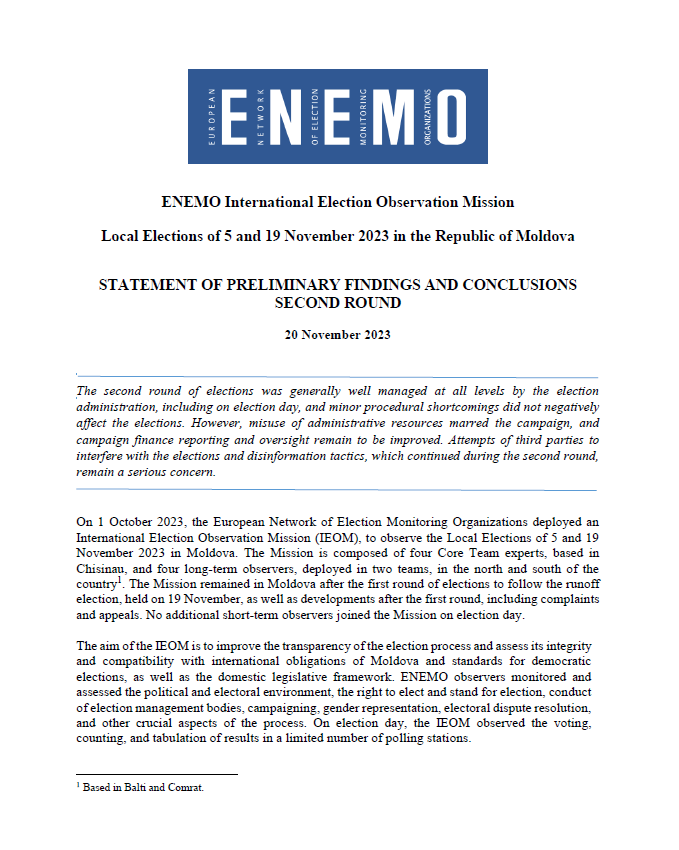ENEMO’s International Election Observation Mission for the 2023 Local Elections in Moldova presented the Statement of Preliminary Findings and Conclusions for the second round
Chisinau, November 20, 2023: “The second round of elections was generally well managed at all levels by the election administration, including on election day, and minor procedural shortcomings did not negatively affect the elections. However, misuse of administrative resources marred the campaign, and campaign finance reporting and oversight remain to be improved. Attempts of third parties to interfere with the elections and disinformation tactics, which continued during the second round, remain a serious concern.” – this was stated by Mr. Dritan Taulla, Head of the International Election Observation Mission of ENEMO for the 2023 Local Elections in Moldova, at the press conference held today at IPN, to present the Statement of Preliminary Findings and Conclusions for the Second Round.
Nino Rizhamadze, Election and Legal Analyst of the EOM of ENEMO, said: “The Electoral Code establishes consistent and mostly unambiguous provisions for nearly all phases of mayoral runoffs, as well as repeat voting. Many shortcomings of the legal framework regarding the conduct of the second round of elections were addressed and clarified in the new 2022 Electoral Code, addressing some of ENEMO’s previous recommendations. As already stated in the Statement of Preliminary Findings and Conclusions for the first round, ENEMO assesses that the legal framework provides conditions for holding elections in line with international commitments and standards.”
The CEC performed within its designated mandate, demonstrating a collegial and transparent approach. Despite challenges faced, such as limited human resources, strict deadlines and a high number of complaints, requests and notifications, the CEC managed the processes, generally, with professionalism and transparency.
“ENEMO notes that timely legal remedy is a cornerstone of resolving electoral disputes according to international standards. Some cases regarding candidate registration were pending on election day or were filed even after the first round of voting. Delays in the processing of such appeals can undermine the integrity of the dispute resolution process. The different forms of documents (notifications, requests, complaints/appeals) used to challenge the electoral process indicate a possible lack of understanding of procedural knowledge among participants, especially when the distinction between these is not explicitly clear. Additionally, a system with numerous submission formats puts a considerable administrative burden on electoral bodies.” – concluded Rizhamadze.
Ales Jakubec, Political Analyst of the EOM highlighted that: “Trends related to the deregistration of candidates continued in the second round. While ENEMO acknowledges the revocation of candidate registration based on serious irregularities in campaign finance reporting, the possible cases of deregistration based on ineligibility to stand for election or discrepancies in the supporting signatures lists should have been adjudicated right after the candidate registration period, within the prescribed deadlines. ENEMO deems that the ongoing dispute-resolution cases created uncertainty among the contestants, and possibly voters.”
The election campaign for the second round was low-key and subdued. As reported during the first round, ENEMO observers were informed of allegations of vote-buying, misuse of public resources, and workplace-related pressure on voters. The Government of Moldova continued to use financial incentives in the campaign, which is at odds with international good practice. Third-party campaigning and interference continued to be a serious concern.
“ENEMO raises concerns that many electoral contestants did not properly follow campaign finance rules and principles, which together with late publication of the CEC campaign finance oversight reports limited overall transparency of campaign finance. Additionally, seemingly due to insufficient capacities and the financial reporting system not yet integrated to other systems, the CEC oversight seems rather superficial at this stage of the process. Various contestants also did not respect the CEC decisions to correct shortcomings within the prescribed deadlines, and the only sanctions applied by the CEC were belated warnings. ENEMO deems that in case of repeated violations and non-respected deadlines, the CEC could have considered applying more dissuasive sanctions.” – concluded Jakubec.
Maja Milikic, Media Analyst of the EOM stated: “The media landscape in Moldova remains a complex interplay of diverse outlets, including those of public interest, investigative journalism, and human rights advocacy, alongside politically controlled and business-oriented media. Media outlets faced obstacles in maintaining fair coverage of candidates, given issues such as non-cooperation and a lack of robust fact-checking. A noteworthy trend emerged as some candidates abstained from debates, influencing public discourse and potentially leading to a less informed electorate. This decision seemed to have been driven by strategic considerations, concerns about debate platform impartiality, or broader political calculations. Candidates often opted for alternative communication avenues, such as social media, public appearances, or outreach, bypassing traditional debates.”
“ENEMO notes that the Audiovisual Council (AVC) continued to operate with efficiency, transparency, and timeliness during the second round of elections, ensuring a robust oversight in monitoring media activities. The second round was subject to a surge of hate speech on various social media platforms, illustrating instances where inflammatory language by politicians contributed to a heightened atmosphere of hostility. The shift to Telegram due to changes in Facebook's policy raises concerns about the potential impact of manipulative information, and the significant influence of TikTok, particularly among the younger demographic, underscores its role in shaping media trends and contributing to information dissemination.” - added Milikic.
The Preliminary Statement issued today is based on ENEMO’s findings on the national level and throughout the regions observed from October 6th to November 19th, 2023. The mission will remain in the country to observe the post-election developments and issue the final report within 60 days from the certification of results.
For additional information, please contact: Maja Milikic, Media Analyst, maja.milikic@enemo.eu, +37361112554
The IEOM of ENEMO for the 2023 Local Elections in Moldova is financially supported by the Delegation of the European Union to the Republic of Moldova, the Embassy of the Kingdom of the Netherlands, and the Soros Foundation Moldova. The contents of this publication are the sole responsibility of ENEMO and do not necessarily reflect the views of the donors.
